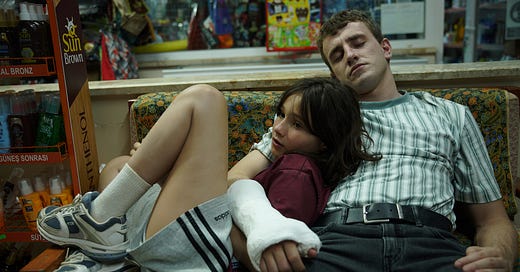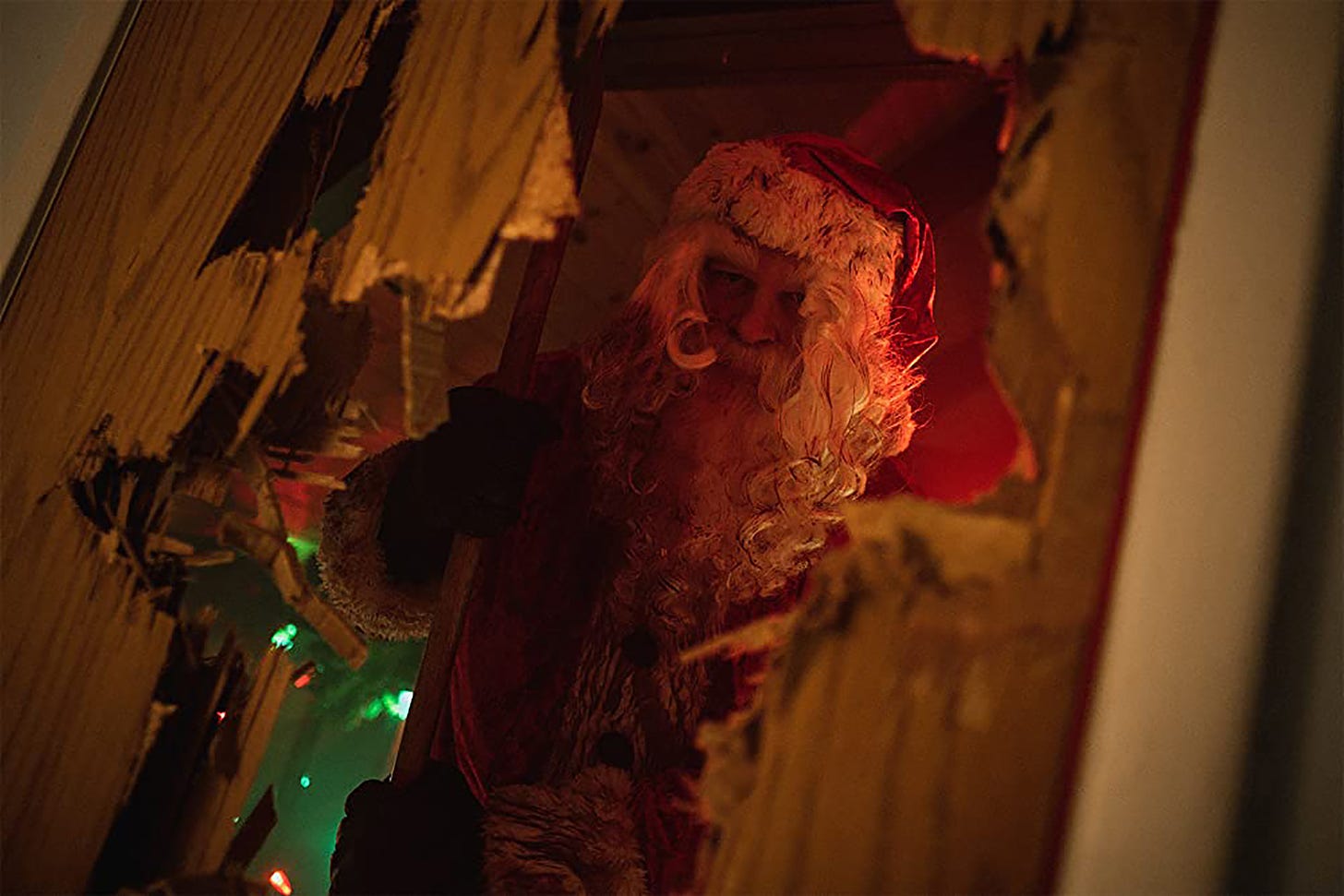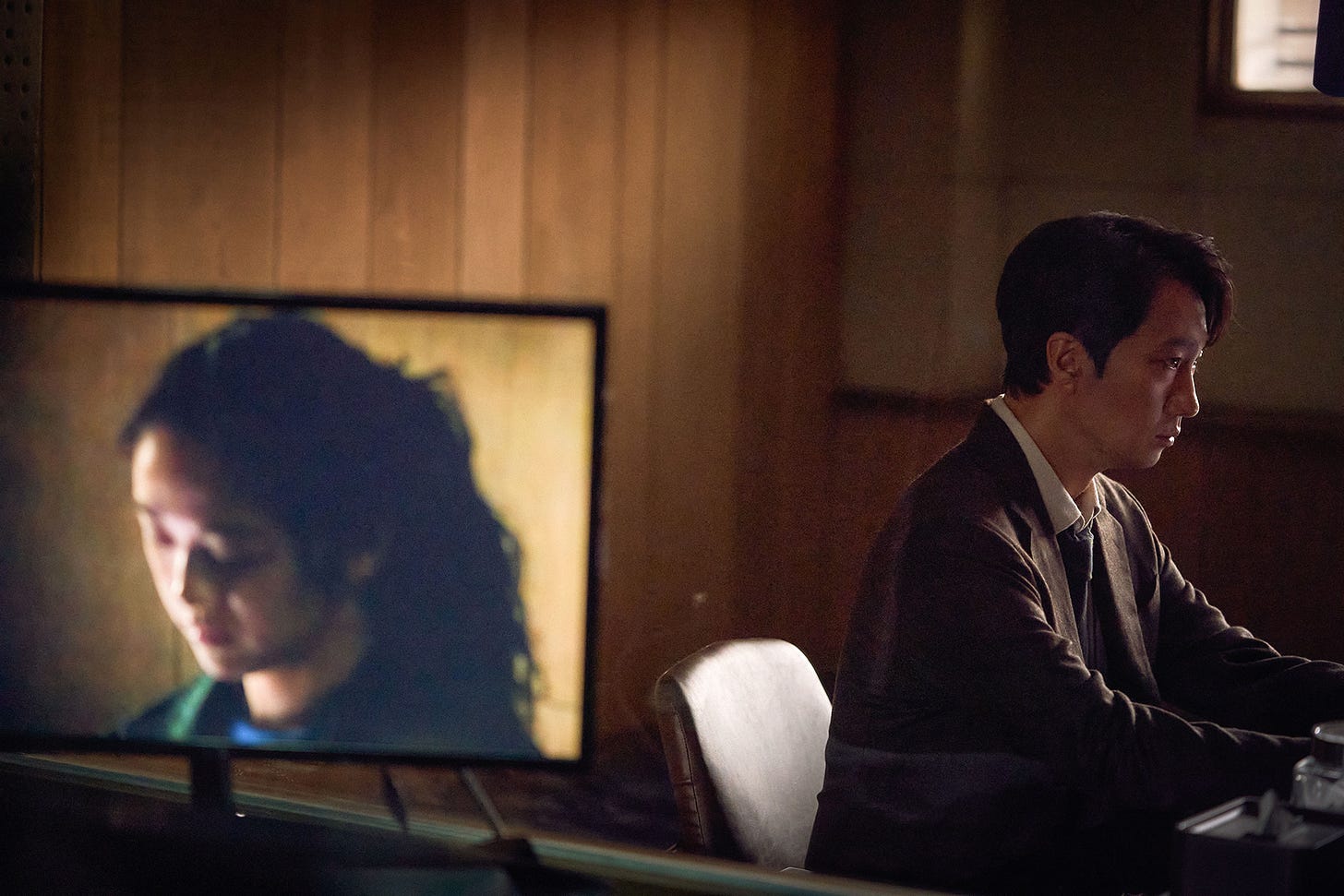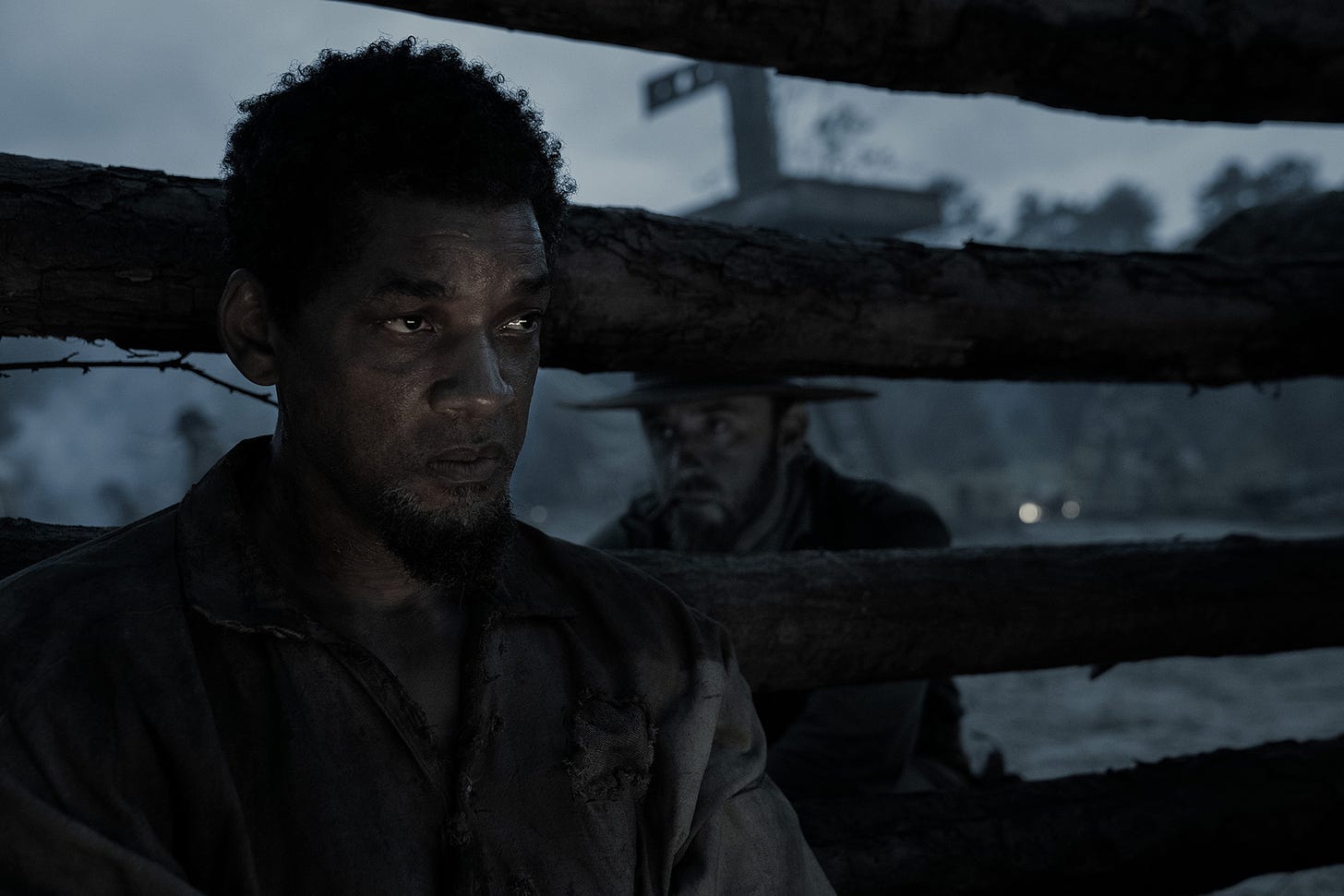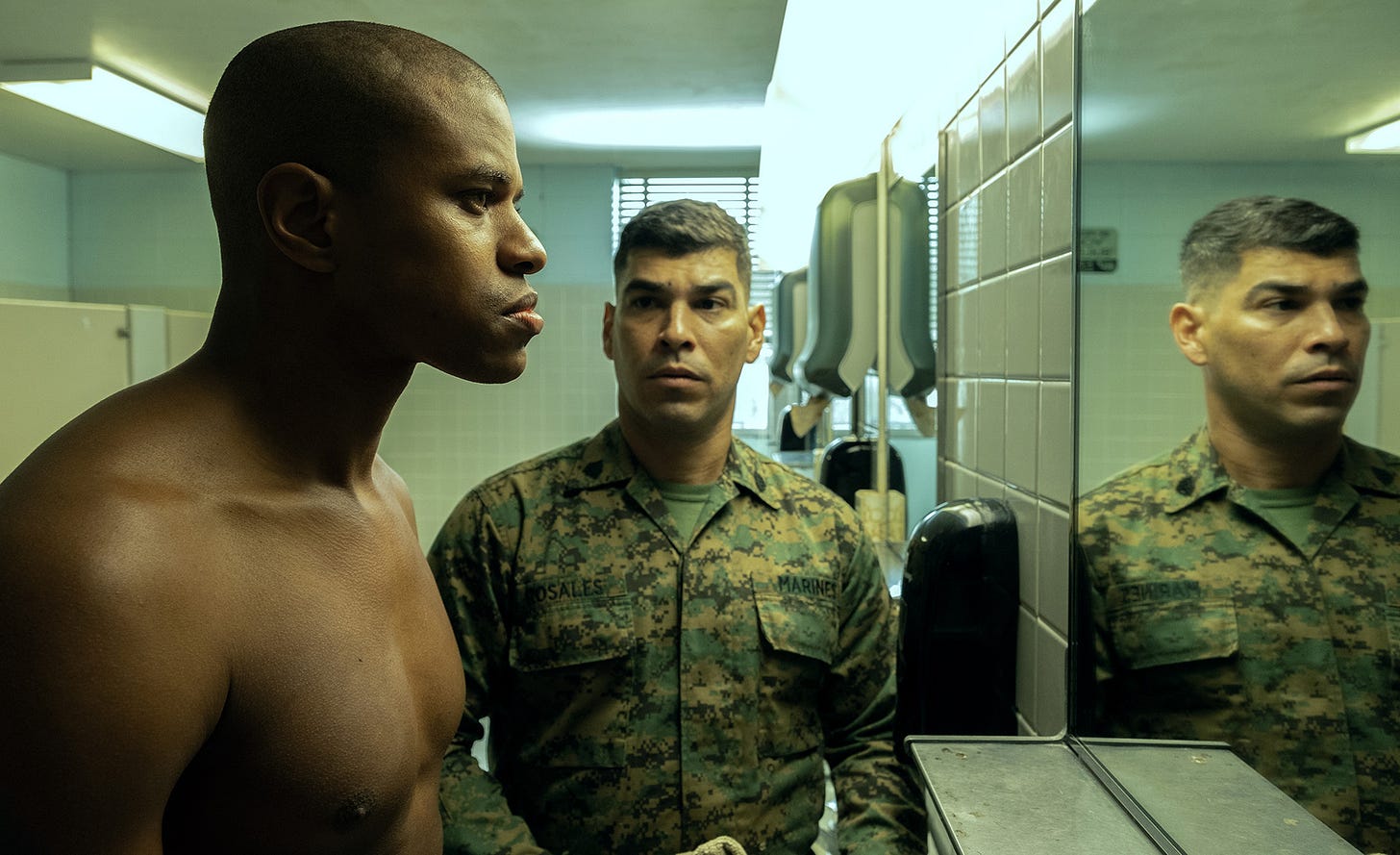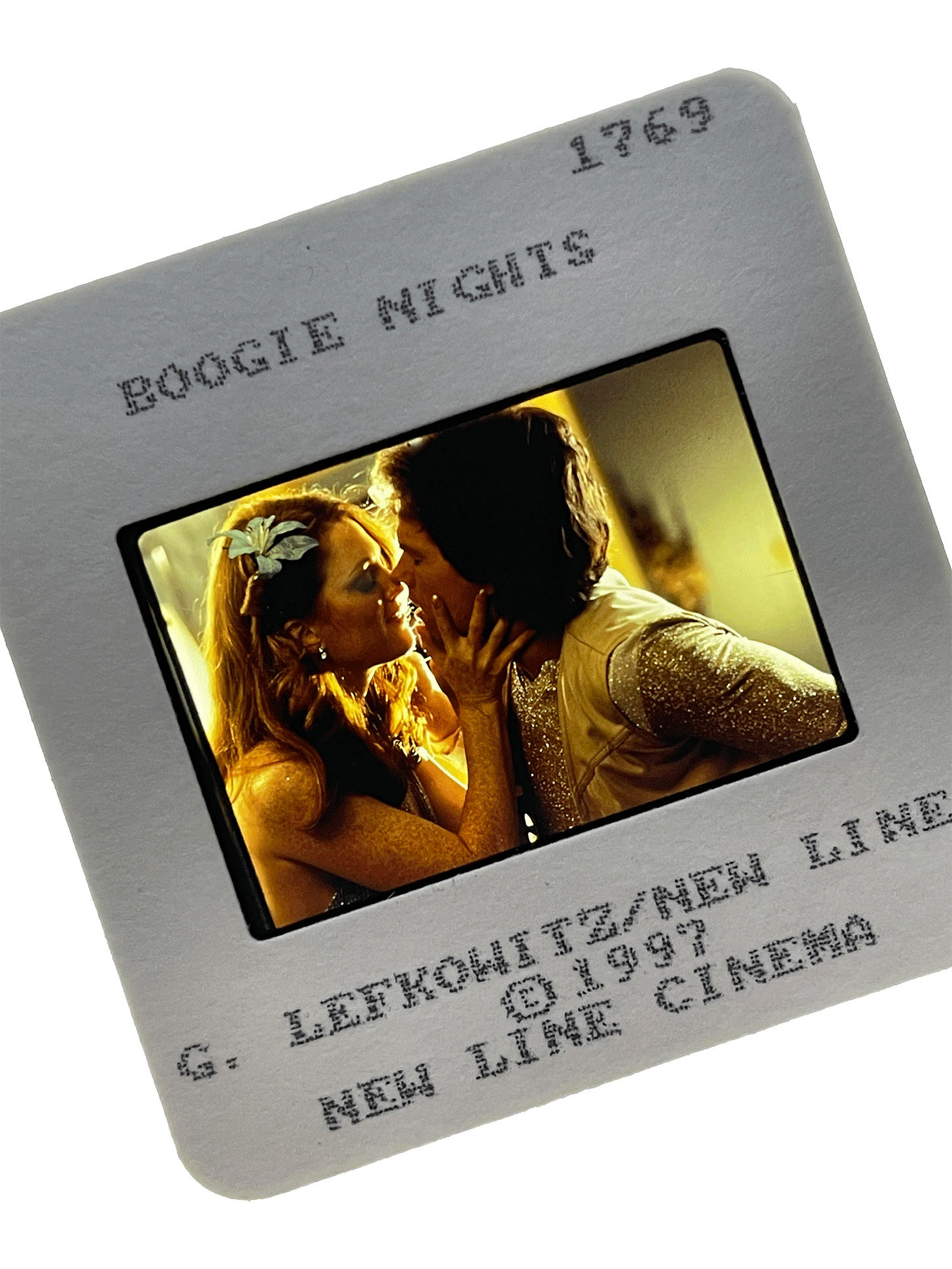As I slowly make my way through the “contenders,” my hope is to also catch as many of the International Oscar selections as I can. I’ve created a Letterboxd list of them all right here if you’re wondering what title each country submitted. Getting to them all is impossible, but it’s a nice way to push myself into treading outside my comfort zone to see what the rest of world is doing with the cinematic medium.
I also wasn’t able to include this month’s Posterized Propaganda last week as it went live at The Film Stage right after publishing my newsletter. There weren’t as many great designs to choose from as there have been in the past, but still some really memorable work nonetheless. I’m going to be starting my Top Ten Posters of 2022 soon to go up sometime around Christmas.
What I Watched:
AFTERSUN
(now in limited release)
The film starts with the broken pixels of a home movie being played and rewound—memories of a holiday in Turkey with father (Paul Mescal’s Calum) and daughter (Frankie Corio’s Sophie). As the picture breaks further with a shift from hotel room shenanigans to an airport farewell, we’re suddenly transported back in time to the moment itself. The frame is clear. The scenes are complete. Calum apologizes for the poor state of their lodgings (under construction and only one bed) before sneaking Sophie over to a different resort with a pool, games, and karaoke so they can have as much fun together as possible.
Charlotte Wells’ feature debut AFTERSUN therefore plays like a happy recollection at the start. We imagine Calum and Sophie sitting on a couch decades later with the footage playing on a television, reminiscing and rejoicing and knowing how many more good times they shared in the years to come. It’s not long, however, before the cracks begin to show. Lines of dialogue like Calum telling a stranger he never thought he’d make it to thirty. Tensions rising as he struggles to keep a smile for his eleven-year-old once the pull of depression grabs hold. And a stunning shift from sunny days on the beach to a dark, strobing rave ratcheting up the sense of melancholy to a deafening roar.
We must question what we’re watching as a result. How much is real beyond those disintegrating minutes caught on the camcorder? How much is filtered through the eyes of a child on the cusp of adolescence with rose-colored glasses about a playful father and an exotic locale with lust in the air? How much is reinterpreted with hindsight to find the signs that Calum couldn’t quite keep hidden even if Sophie didn’t quite understand them then? Moments like Calum refusing to sing feel like a betrayal one second and a cry for help the next. Genuine pleas to stay close and honest feel unfulfilled once the climax set to David Bowie and Queen’s “Under Pressure” hit us with a sledgehammer of metaphoric emotion.
And Wells leaves the details unspoken via a formally fluid, sensorial experience. She doesn’t overtly tell us what happens after Sophie goes home. She simply leaves clues via rugs, postcards, and a growingly disjointed sense of linear space and time. Maybe we’re dealing with suicidal ideation. Maybe full-blown suicide. Perhaps Sophie is searching for answers because Calum isn’t there to provide them. Or maybe he is, but won’t. All we really know for certain is that their love for each other was undeniable—Mescal (unforgettably vulnerable) and Corio’s performances ensure it. But as too many have figured out from their own tragic lives, love isn’t always enough.
- 10/10
CHRISTMAS BLOODY CHRISTMAS
(now streaming on Shudder and available on VOD/Digital HD)
Just because you can use military-grade robotics to create an animatronic Santa Claus that’s able to replace so-called “degenerates” at your local mall doesn’t mean you should. Because all it takes is one faulty line of code to turn those bundles of holly jolly into homicidal maniacs hell-bent on destroying any human (young or old) that crosses its path.
That’s all the exposition Joe Begos provides (and needs) for his latest holiday slasher CHRISTMAS BLOODY CHRISTMAS. The local toy store has one of these new Santas and they’ve ignore the nationwide recall since it’ll be taken down soon anyway. So, Dora Madison’s Lahna and Jonah Ray’s Jay keep their plans to have sex on Santa’s throne at closing time, unaware their red and white sentry is about to split them in half.
I really enjoyed the first two acts as their lo-fi aesthetic and snappy dialogue kept me entertained until the punishing violence could take its place. I would have liked an actual story similar to Begos’ VFW, but it’s not necessarily crucial to having a good time. Riley Dandy and Sam Delich’s Tori and Robbie are enough fun with their easy, flirtatious rapport while cameos from Jeremy Gardner and Jeff Daniel Phillips help keep the one-note aspect of a killer Santa on the loose relevant.
Things eventually fall apart when the film decides it doesn’t want to end en route to falling into a loop of repetitive back-and-forth carnage pitting Dandy and Abraham Benrubi’s menacing robot against each over and over again, but doing so is the difference between a sixty-minute movie and an eighty-minute one. Milk it a bit, hope things don’t grow too stale, and blow stuff up. It does the job.
- 6/10
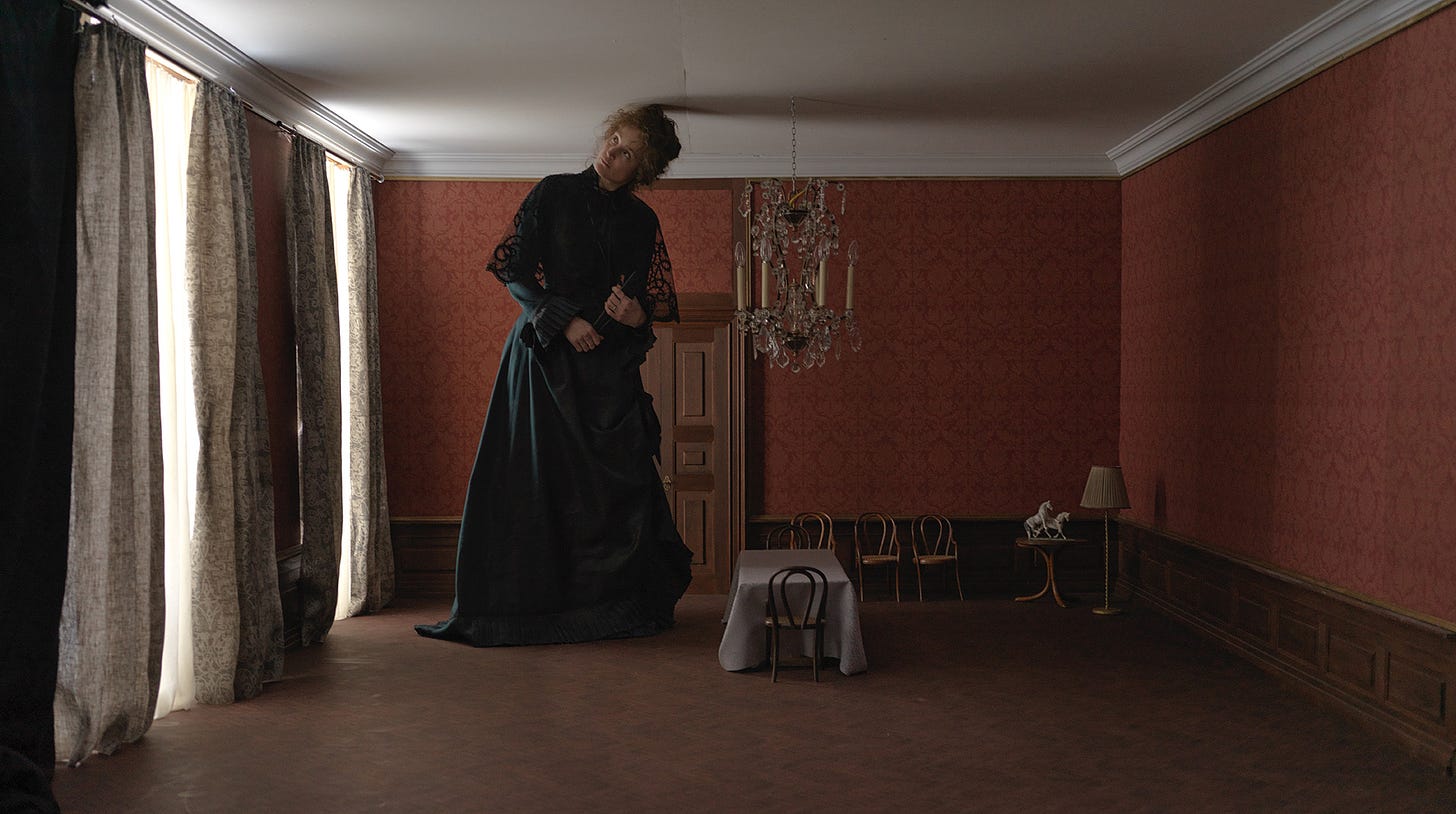
CORSAGE
(Austria’s International Oscar submission)
Judd Apatow jokes aside, Marie Kreutzer’s CORSAGE could have easily been titled THIS IS 40. Empress Elisabeth of Austria (the always wonderful Vicky Krieps, who tied for best performance at Cannes and should be a dark horse candidate for an Oscar nomination if the Academy was more willing to watch foreign films) has just celebrated her milestone birthday on Christmas Eve 1877 and everything has changed as a result. Suddenly transformed into fodder for tabloids with topics like weight, health, and adultery, she wants more than the life she’s led as a silent figure by her husband’s side. What had been a dream now felt like a prison.
The film unfolds during a course of a year as depression, listlessness, and rebellion alternatively take hold of Elisabeth. She wants to be free. She wants to be useful. She wants to laugh without having to wonder how her court or subjects interpret that laughter. Because having fun with her riding instructor is “unseemly.” Wanting to spend time with her children alone by sneaking off with them in the night is “reckless.” She laments that her entire purpose is to braid her hair and stand by her husband’s side with a smile because it’s the truth. To want more is to be labeled insolent.
It’s a tragic series of vignettes that at first seem as though Elisabeth is a vain empress who simply seeks the adulation of her youth by leading every conversation to a place where she might be complimented (even in an insane asylum). But the psychology is much more complex. That flattery was how she knew she was doing her job correctly. Existing as a woman in a monarchy ruled by the patriarchy, her sole purpose was to be admired. So, once the world stops (or shifts tone from earnestness to obligation), she opens her eyes to wanting more. Unsatisfied by the status quo, she seeks pleasure and in turn feeds the fickle fire that is her dissolving reputation in the minds of her detractors.
The parallels to today’s misogyny are obvious (the asylum director’s commentary on the women in his care is as reductive and cruel as you can imagine) and Elisabeth’s steadfast determination to be heard as deafening with a disgruntled look as it is with a fist pounding on the table. Krieps is as captivating in the dramatic moments as she is in the comedic ones—suicidal tendencies, dereliction of duty, and obscene gestures (flipping the bird to a dining room of dignitaries) alike. Kreutzer also leans into the freedom of fictionalization to distill Elisabeth’s awakening into meticulously structured, month-long chapters while introducing anachronistic details like The Rolling Stones’ “As Tears Go By” being played on a harp. It’s a lively enterprise that goes beyond historical fact to capture a prevailing attitude instead. It’s not about what Elisabeth did, but why she had no choice but to do it.
- 7/10
DECISION TO LEAVE [Heojil kyolshim]
(now streaming on MUBI and available on VOD/Digital HD; South Korea’s International Oscar submission)
Leave it to Park Chan-wook (and co-writer Jeong Seo-kyung) to make a legitimate crime thriller into a romance. Because that’s what DECISION TO LEAVE is. Seo-rae (Tang Wei) isn’t a femme fatale leading the detective (Park Hae-il’s Hae-joon) who’s investigating the case surrounding her husband’s death around in circles. Well. Not completely, at least. She is in some respects. And he gladly lets her despite what his gut might say. But there’s more to it than just that. There’s also the game within the game. The sense of finally being seen. That it arrives under such dark circumstances doesn’t diminish its power.
What Park does is so remarkable because this film never feels as though it’s hampered by tonal shifts. He’s not trying to marry two disparate threads together in such a way that we must lose one to grab the other and vice versa. Death is the catalyst for love. One does not exist without the other, so nothing is out of place. It doesn’t therefore matter how it begins (him finding her attractive, her needing him to believe her innocence) because that which is born out of the connection forming between them is real. So real that it remains overtly unspoken. It’s consummated by chapstick and sushi. Voice notes and inside jokes.
It’s Hae-joon’s sleep patterns that reveal their love. And Seo-rae’s impulsivity. Just because they can’t be together doesn’t mean they don’t wish they could. She asks him once about whether the person you love choosing someone else means you cease loving them and the film becomes the answer that she never receives: No. It doesn’t. You accept reality. You move on. But those feelings don’t simply disappear. They linger in your subconscious. They influence your actions. And they come flooding back the moment your space and time apart abruptly ends, intentionally or not.
The question then is whether you embrace the reunion or fight it. Park and Jeong mirror their story so that which was given the benefit of the doubt the first time around isn’t the second time. And if that benefit wasn’t deserved then, it might be now. Sadly, hindsight colors things just as much as lust. What seems like a trick might be genuine. What seems genuine is probably a trick. And no one wants to be the fool—even if love guarantees they must. They’ll eventually discover their feelings are both too much and not enough, taking control of their lives to the point where they cannot function. It forces them to refuse the happily ever after so as not to destroy everything else.
Except, of course, that it’s already too late. Like a song that won’t leave your head, the idea of being together has imprinted itself. It has left them both incomplete halves of a whole that was “solely” ever formed via its potential. Cop and suspect. Husband and widow. They shouldn’t work. They can’t work. Yet here they are risking everything anyway only to ultimately remember why it was always unattainable. So, while DECISION TO LEAVE may not seem as twisted as some of Park’s previous works, it will eventually prove itself worthy to fit his singular oeuvre. Because their love only works from afar. And it only remains that way if coming closer is no longer possible.
- 10/10

DON’T WORRY DARLING
(now on VOD/Digital HD & streaming on HBO Max)
It’s sometimes tough to separate the film from the noise. After countless rumors and speculation getting the whole world to turn on Olivia Wilde in a not so ironic nod to the misogynistic themes of the movie itself, going into DON’T WORRY DARLING devoid of preconceptions proved impossible. Would I find Harry Styles' performance lacking because I heard it was? (He’s fine.) Would I find the messaging shallow because everyone else said so? (They were correct.) Or would I discover that the work’s real problem was the fact that it kept reminding me of better films?
That familiarity isn’t a deal breaker, but it does put a damper on the experience. And the reason is unfortunately a backhanded compliment insofar as saying that Katie Silberman’s script possesses real intrigue. There’s good tension in the obvious “through the looking glass” nature of the whole. The production design is wonderful and the imagery used to signal when Alice (Florence Pugh) is remembering something from a past that has seemingly been erased is effective. It all gets our minds pointed to the only logical answer that can exist and that ease has us anticipating a left turn that sadly doesn’t come.
Because it shouldn’t be that simple. Not unless you’re going to subvert the expectations Hollywood has conditioned us to predict. But we get no smart reversal or surprise revelation. We only receive exactly that which we knew we would. Not only that, but it’s presented in a way that seems to believe Alice—the perfect wife for her perfect husband (Styles’ Jack) in the perfect home (Victory)—has a choice. Peel back the layers that Wilde and company present, however, and it’s pretty clear that she doesn’t. Consciousness does not equal consent. So, letting her pause and consider the status quo undercuts the entire premise of her prison.
It’s funny. I had completely forgotten all the comparisons made between Chris Pine’s character (Victory’s steward, Frank) and Jordan Peterson until I started thinking to myself “Man, that’s some real Jordan Peterson nonsense.” Then it clicked. And clicked even further when the film finally turns the clock back to reveal Alice and Jack’s origins.
Waiting that long to receive this exposition via flashback is crucial, though, because it allows the game to unfold. The script’s structure (and Wilde’s direction) is quite good at showing us only what we need at any given time. I just wish it was in service of having something more to say since its abruptness ultimately prevents it from having to say anything. It tries to equate showing its strings with insight. The result feels like a TV pilot cliffhanger meant to force the suits into greenlighting the real meat of the story via a full season pick-up that isn’t coming.
- 6/10
EMANCIPATION
(now streaming on AppleTV+)
Seeking to tell the story of the man known as “Whipped Peter” from the infamous Civil War-era photograph that showed the nation the scars of slavery, screenwriter Bill Collage, director Antoine Fuqua, and star Will Smith deliver EMANCIPATION with all the sweeping epic trappings you’d expect from a historical genre piece. For two-thirds of the runtime it’s a runaway slave escape thriller as Peter (a very effective Smith) survives the dangerous Louisiana swamps with hunter Jim Fassel (Ben Foster) on his tail. The final third is an expansive, brutal attack pitting freed Black men against a Confederate stronghold to ensure Lincoln’s proclamation can’t be ignored.
Does it bring anything new to the “slave film” table beyond giving life to the man in that photo? Not really. It’s best when it’s showcasing its action whether Peter fighting a crocodile or wreaking vengeance on his oppressors because the dialogue can get so self-serious (Foster receives a monologue so over-the-top I almost chuckled) that it becomes impossible not to remember a white man wrote it all. And while I get why we keep going back to the plantation to see Peter’s wife (Charmaine Bingwa) and children, he is so desperate to return to them that the lack of propulsion in those moments beyond supplying us more violence renders them unnecessary. As long as Peter doesn’t forget them, neither will we.
When it’s not trying to do too much, though, EMANCIPATION does prove an emotionally-charged drama with enough suspense to keep us invested regardless of our knowing Foster and his men can only maim Peter so as not to prevent him from reaching the finish line. Our intrigue is therefore more about how they ultimately fail to capture him either by Peter’s determination or a couple fateful miracles.
I use “fate” intentionally here since the film really wants me to thank “divinity” instead—Peter’s continued “praise-be-to-God” rhetoric undercutting the strength and perseverance showcased. I’ll never get behind the idea that God tortured these men and women so that He could then be worshipped by them once they finally extricated themselves from His, by definition, intentional callousness. It’s plotlines like this that remind me why I no longer go to church.
- 6/10
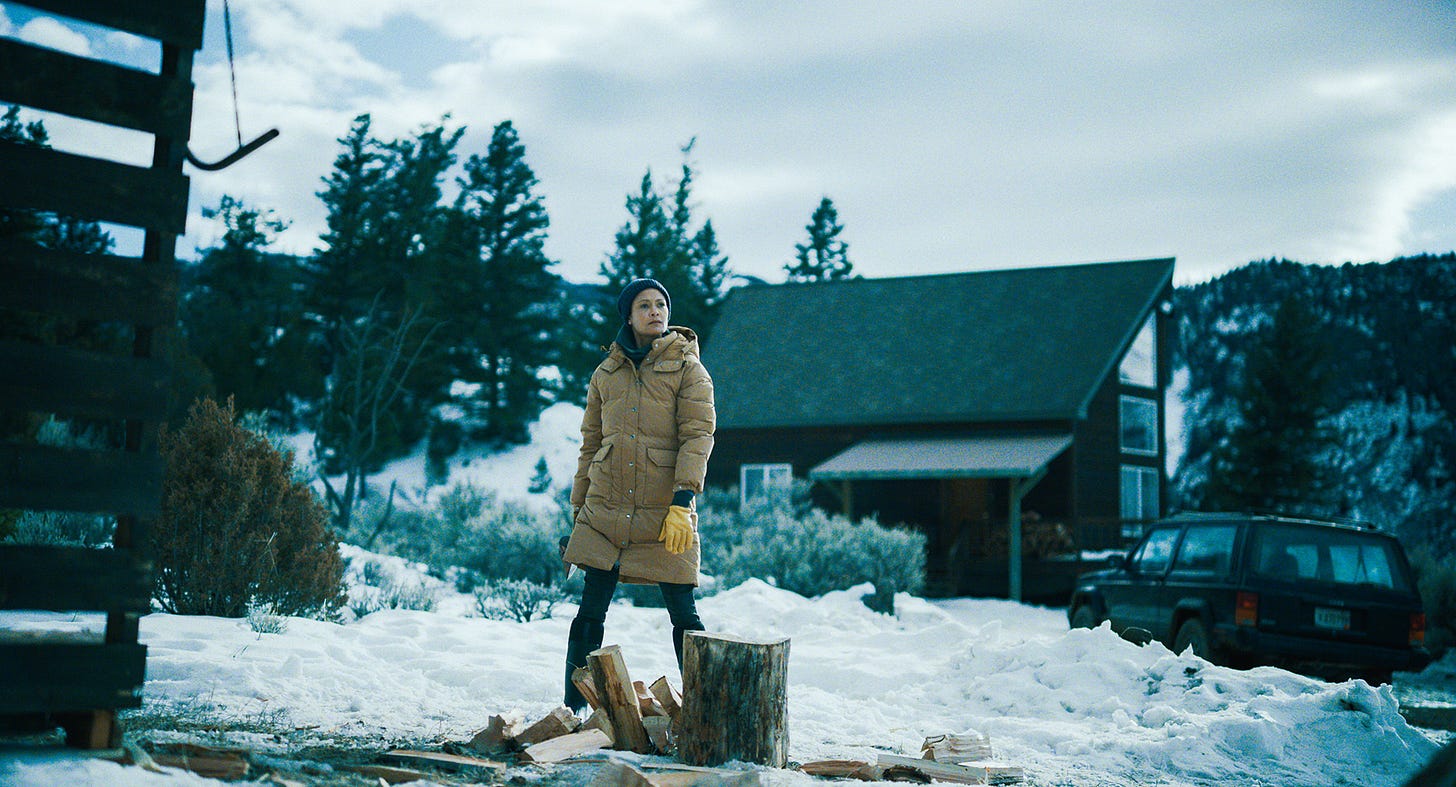
GOD’S COUNTRY
(now on VOD/Digital HD)
When is enough enough? It’s the central question to all conflicts. Do you relent or do you push forward? Do you strive to find a solution or do you attack for victory? And which is right? Which is moral? You could argue that it depends on the circumstances. On context. That which is just can also be criminal. That which ends the issue today can ultimately ensure that it rears its head again in the future—more often than not, worse than before. As Sandra (Thandiwe Newton) explains to Nathan (Joris Jarsky) about halfway through Julian Higgins’ GOD’S COUNTRY, common ground demands sacrifice. But one can only keep sacrificing him/herself so many times before the moment arrives for the other side to finally understand what suffering is.
Adapted by Higgins and Shaye Ogbonna from James Lee Burke’s short story “Winter’s Light”, the conflict at the story’s core is never quite as simple as trespassing. Yes, Nathan and his brother Samuel (Jefferson White) have decided to use Sandra’s property as a staging ground for their hunting without her permission. Yes, she could have let them do so without any drama by simply looking the other way. But what would that silence actually cost? Condoning their white male privilege to ignore her right of ownership (“the cost of living in the country”) while enforcing their own (“mind your business”) only reinforces it. This hypocrisy is born from control (misogyny). It’s born from hate (racism). And, of course, fear-fueled entitlement.
You should be surprised by the amount of revelations positioned with time-released precision. What is Sandra actually grieving when she grieves her mother’s death? Why did they move to the middle of nowhere from New Orleans? Was she running from her past or from herself? Each new detail colors everything that occurred previously. Each conversation devolves into “us versus them” no matter how cordial their origins or how concrete an understanding had seemingly been found. And it all stems from the duality of who Sandra is and wants to be juxtaposed against what her neighbors believe they are and what their actions conversely reveal. We want to believe in righteousness, either through God or ourselves, but we too often forget that it cannot arrive at the cost of another.
There are so many great performances marked by self-recognition, especially as a result of situational awareness and knowing when they can feel emboldened without threat or repercussion. Jarsky wrestling with his pain and the knowledge that hurting another won’t help alleviate it. Jeremy Bobb’s acting sheriff acknowledging the farce of his authority and the lack of imagination his sheltered experiences have cultivated. Kai Lennox’s department chair recognizing the embarrassment born from his indignation in real time. And Newton accepting the nuance of her fight and the impossibility of real change without power. That’s where rage becomes necessary. Once the world grows indifferent to the rules meant to protect the less fortunate, civility and reason are dead. Words become meaningless without action.
Society has been pushed into the gray areas to acknowledge that innocuous events can spiral out of control and that incendiary ones demand a response. Newton delivers one of the year’s best turns with a character who can no longer avoid accepting that these truths are universal. You can leave one place for another, but it’s meaningless when the system remains broken. Maybe it’s more manageable for a time. Maybe it doesn’t concern you as much here as it did there. But it doesn’t go away. And the more we allow it to fester and grow, the less chance there is to survive it without violence. Verbal. Psychological. Emotional. Physical. By the end, violence is the only language we have left.
- 9/10
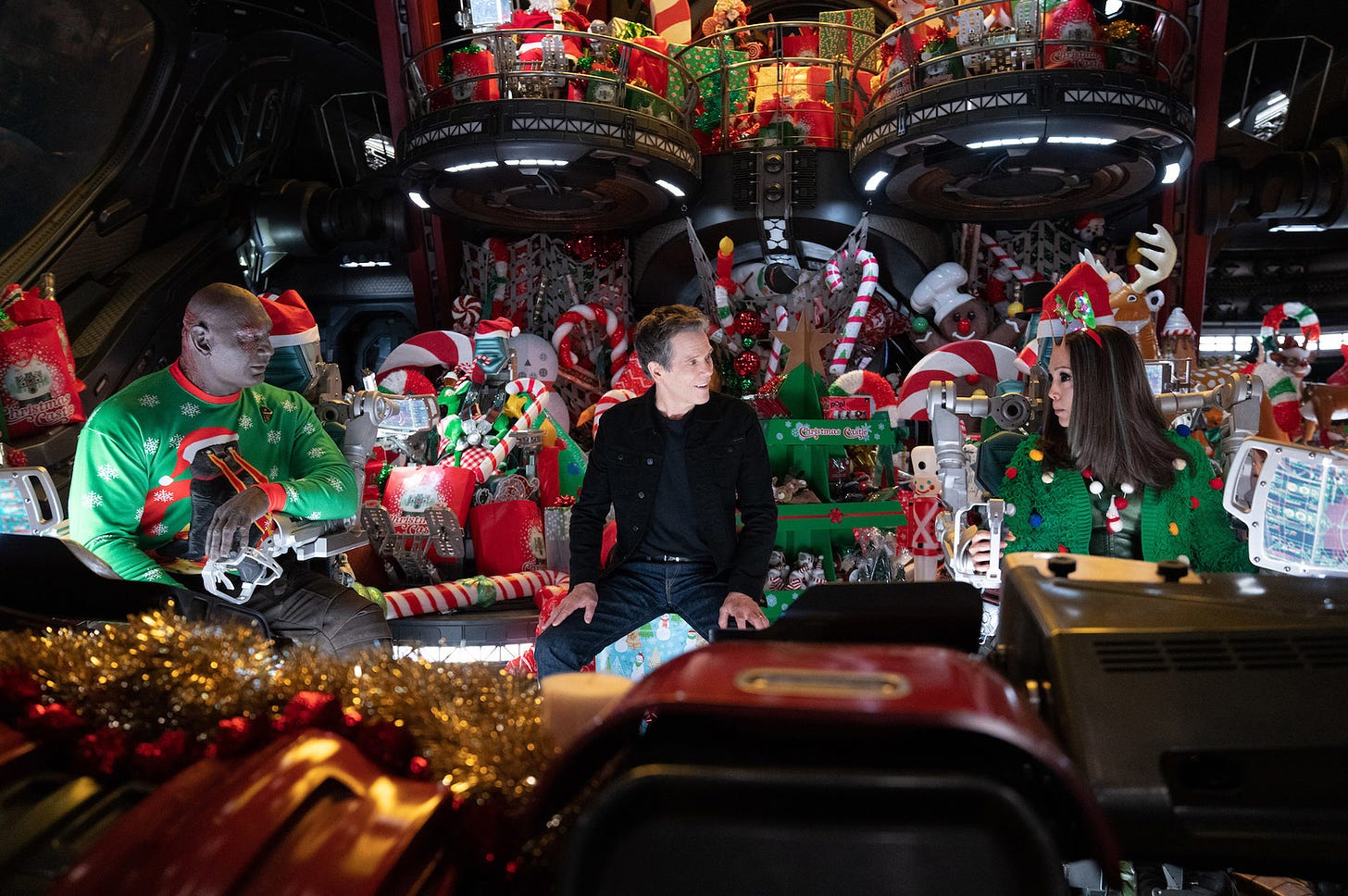
THE GUARDIANS OF THE GALAXY HOLIDAY SPECIAL
(now streaming on Disney+)
In the grand tradition of my childhood wherein Christmas Specials were a staple in our house—we had a VHS of all our favorites recorded from TV—James Gunn’s THE GUARDIANS OF THE GALAXY HOLIDAY SPECIAL arrives to bring some laughs, heart, and, of course, built-in marketing for the forthcoming GUARDIANS OF THE GALAXY VOLUME 3.
It’s a fun premise that springboards off an animated memory told by Sean Gunn’s Kraglin about the time Yondu (Michael Rooker) ruined the yuletide spirit a young Peter (Chris Pratt) strove to instill aboard their spaceship. Hoping to bring a smile to the now tired and sad Star-Lord (post-Gamora’s death and post-purchasing Nowhere to operate), Mantis (Pom Klementieff) and Drax (Dave Bautista) decide to fly to Earth and get him his hero as a gift: Kevin Bacon.
The whole is about what you would expect from letting Mantis and Drax loose on unsuspecting humans. Bacon is game to play along and the show even delivers a couple new Christmas songs to pair with the underrated “Christmastime” as sung by The Smashing Pumpkins during a climactic reveal. And while this adventure with familiar MCU characters may not add to the franchise in any real sense, it provides a sweet little PG-13, family-friendly distraction.
- 7/10

GUILLERMO DEL TORO’S PINOCCHIO
(now streaming on Netflix)
“Terrible, terrible joy.” That’s what Geppetto (David Bradley) laments when asked what he felt during the time he had with young Pinocchio (Gregory Mann). Joy because it reminded him what it was like to live again after years spent drunk and alone after the tragic death of his son Carlo. Terrible because it couldn’t last. That’s the thing about love and life. We love with all our hearts because we know life isn’t forever. So, we must live as if there’s no tomorrow. And love with everything we have even though the resulting pain will prove just as strong.
It’s almost unfair that Guillermo del Toro’s PINOCCHIO came out the same year as Disney’s live-action retelling of their own famed adaptation of Carlo Collodi’s book since the latter never stood a chance. While co-written with Patrick McHale, co-conceived story-wise with Matthew Robbins, and co-directed by Mark Gustafson, you can forgive the Mexican filmmaker for having his name in the title since he wore so many hats in its creation. Lending his trademarked heart amidst darkly nightmarish visuals and unsentimental lessons, del Toro allows the themes of mortality and identity to shine through this fairy tale set against the backdrop of Italian fascism. And the animation is unrivaled. I assumed it would be on par with Laika, but the fluidity of motion and cinematography might even be better.
Fathers, the “Fatherland”, and totalitarian masters each seek to control and mold their “sons” only to witness them rebel. Will they fall prey to their pride? Or will they open their eyes to the reality that they have no ownership over their wards’ desire for independence? We know the answer for the likes of Podesta (Ron Perlman) and his glee at discovering how a wooden puppet who cannot die can become the perfect soldier. We know it for Count Volpe (Christoph Waltz) too once he seeks to exploit the boy for financial gains as his parlor trick devoid of strings. The question is therefore poised to Geppetto. Can he accept Pinocchio as he is? Or will he strive to turn him into Carlo?
It’s an adventure through Italy on land and sea with as much death as comedy (How great is the hook-handed captain Geppetto hires to take him across a mine-strewn sea guarded by a monstrous beast?), narrated by the eloquent Sebastian J. Cricket (Ewan McGregor). He takes us through the underworld to meet Death (Tilda Swinton) and her rabbits, to the circus with the conflicted monkey Spazzatura (Cate Blanchett), and to the battlefield beside child soldiers like Podesta’s own son Candlewick (Finn Wolfhard), each vignette a new lesson about humanity told with a severity that will make some parents shield their kids from watching. And that’s exactly why they must.
The best children stories are those that refuse to talk down to their audience. They let a character like Pinocchio die with the flair of immortality so that he can begin to see the finality of the sort of death he’s escaping. That’s the cost of forever. We see it with Peter Pan too. Life is nothing without loss and sacrifice. To risk everything for those you love is to know they will do the same for you. To survive is therefore the burden, but one you must shoulder with strength to honor those who’ve been lost. If that’s not a worthwhile lesson (along with a rudimentary education on fascism at a moment in time where we mustn’t forget), I don’t know what is.
- 9/10
THE INSPECTION
(now in limited release)
Disowned by his mother (a very good Gabrielle Union) for being gay and on the streets for five years, Ellis French (Jeremy Pope) decides at twenty-five that his only chance at a future is through drastic change. If he was going to end up dying in an alley with no one to mourn him anyway, why not join the Marines and risk dying in uniform, as a hero? So, he enlists during the military’s “Don’t Ask, Don’t Tell” era, endures the homophobia and abuse at the hands of fellow recruits and a drill sergeant (Bookem Woodbine) operating under the imperative that he mold monsters rather than soldiers, and eventually finds an identity with which to move forward.
Inspired by his own experiences, writer/director Elegance Bratton pulls no punches with THE INSPECTION. He’s not looking to sanitize what occurs behind closed doors, whether they shield the world from the hate that runs rampant in private homes or the toxic culture meant to break down and build-up young men and women in the armed forces. It’s all there from near-death tragedies born from entitlement and power to xenophobia towards American Muslim enlistments to finding the balance between protection and betrayal within an environment fostered by those who believe the distinction is black and white despite it being populated by a newer generation that refuses to agree.
While the movie does its best to center French’s trials and tribulations as a not-so-closeted gay man doing everything in his power to graduate amongst a handful of men who’d enjoy him failing, it doesn’t necessarily do enough to elevate what ultimately proves just another abusive boot camp depiction. That’s not to say the moments that allow the character’s homosexuality to be a focal point (the strained relationship with his mother and the honest conversations with another drill sergeant, as played by Raúl Castillo) aren’t memorable enough to help the whole stand apart. The injustices remain familiar. The attacks remain predictable. And the “oorah” sense of family that’s always born from the fire does little to make us forget the reason those flames grew so high.
Pope is great, though. Bratton puts a visual stamp on certain scenes (especially dream sequences) and allows for emotional nuance to appear whenever you think things have moved into the binary realm of happy or sad endings. It probably helps that this is his life, but his refusal to pretend that any step forward doesn’t come with a price means something. It being his story to tell also lets me excuse the fact that its jingoistic notion of using the military as a replacement for family feels like a marketing vehicle. I’m glad it gave him that and that the armed forces give many lost souls purpose. But those positives will never outweigh the negatives glossed over throughout as “tough love” via communal silence and/or bare minimum contrition.
- 7/10
THE KINGS OF THE WORLD [Los reyes del mundo]
(Colombia’s International Oscar submission)
Laura Mora Ortega’s THE KINGS OF THE WORLD is in many respects a ghost story about five lost souls fending for themselves with machetes on the streets of Medellín who leave in search of the life that was taken from them when the government seized miles and miles of land from their people to mine gold. Ra (Carlos Andrés Castañeda) has finally seen the fruits of his grandmother’s labor thanks to the court’s ruling in their favor as far as reclaiming her property. So he, Sere (Davison Florez), Winny (Cristian Campaña), Nano (Brahian Acevedo), and Culebro (Cristian David Duque) set off to take that which should always have been theirs.
Ortega and Maria Camila Arias’ script starts with the boys’ kinetic exploits in Medellín and continues with the liberating fun that ensues when hitching rides on truck beds and taking shelter in brothels. But as the camera steadies from handheld origins, the danger mounts. The closer they get to their destination—a sort of wild west ruled by oppressive entities willing to kidnap and kill any trespassers—the more difficult and seemingly futile their adventure becomes. Ra and his “kids” must survive outside figures, the betrayal of one of their own, and the same corrupt political system that displaced them in the first place.
And all the while they meet kind souls ready to lend a hand too. The “crazies” left to fend for themselves and the stubborn specters of a long-gone past still clinging to the charred remains of what had once been paradise. It’s a pretty dark drama with wishes being granted in unintended ways as spirits ride the Colombian rivers to the ocean to free themselves from the burden of an existence forever on the impoverished fringes. In some regards it leads to a tragic ending for boys who had possessed energy and life to spare. But it’s also an inspirational battle cry since all they really wanted was something to fight for. Something that was theirs to protect no matter the cost.
- 7/10
RETROGRADE
(now streaming on Disney+; streaming on Hulu starting 12/11)
Without ignoring Matthew Heineman’s great earlier works, there’s a definite kinship between last year’s THE FIRST WAVE and this year’s RETROGRADE as far as documentaries taking an objective, fly-on-the-wall approach to events in real-time. Just like he couldn’t have known what would transpire at the start of the COVID-19 pandemic, heading to Afghanistan at the beginning of 2021 had as much potential for filming a flawless transition of military force as it did the unfortunate hostile takeover that ultimately transpired. The story wrote itself. Heineman’s team was merely brave enough to capture it.
That’s not to say the final result doesn’t find an agenda in the edit. You can’t watch what occurs between the time Biden announces a full-scale withdrawal of troops from the country after a twenty year presence and Kabul being overrun by Taliban without acknowledging the big picture theme of America’s undeniable fault. Two decades and trillions of dollars (let alone thousands of lives) and the US really just left Lt. General Sami Sadat and his army out to dry. You can’t justify any of it—not even killing Osama bin Laden—when you’re willing to simply let the angrier and more powerful enemy that you’ve emboldened (How devastating yet honest is it hearing a US soldier admit their violence helped recruit today’s Taliban?) to gain control.
It’s a tough watch as a result. A portrayal of hubris and mismanagement on behalf of the world’s so-called “protectors” and abject futility on behalf of those who rose to their feet to risk everything in pursuit of a promise left unfulfilled. From Green Berets breathlessly putting their hands in the air when ordered to destroy loose ammunition rather than give it to Sadat to the General’s own government abandoning him at his greatest time of need, we’re shown the reality that evil rarely ever has to fight for power. Too often it must only walk through an open door.
- 8/10

SHE SAID
(now in theaters and available on VOD/Digital HD)
I want to say it’s surprising that there hasn’t been as much of an Oscar push for SHE SAID this year as there was for Best Picture winner SPOTLIGHT in 2015, but it’s not. The conversation surrounding sexual misconduct and rape is still one that’s constantly being shrugged off, labeled as a “product of its time,” or pivoted into another example of victim-blaming. It will therefore be interesting to see whether The Academy ignores the silence and watches anyway because I do believe it has legs to garner a handful of nominations.
The two easiest names to highlight are director Maria Schrader (the whole is just as riveting as Tom McCarthy’s film while juggling a ton of moving pieces) and actor Carey Mulligan, who is campaigning as “supporting” (a shrewd move putting the stronger performance in a better position to win considering she and Zoe Kazan are really co-leads). Rebecca Lenkiewicz’s script has a shot, but I do believe it’s a bit too heavy-handed in parts—a lot of “telling” rather than “showing” in ways that feel redundant—to really break through.
This is a stirring document about an important subject that details the arduous journey from a random call with Rose McGowen to a bombshell news report that ignited a firestorm (and ultimately put Harvey Weinstein behind bars). The ways Jodi Kantor and Megan Twohey had to carefully wield the off-the-record facts they accrued as a means to turn more people onto their side with corroborating details and damning evidence is a testament to their ingenuity and professionalism. Because there are a lot of closed doors here. A lot of dial tones. Get that first person to talk, though, and that knowledge helps the next know they aren’t alone.
Special notice for Jennifer Ehle and Andre Braugher. Their roles are very small, but crucial pieces to the puzzle. And it’s also inspiring to see Ashley Judd play herself (the first victim of Harvey’s to agree to go on-the-record) and Samantha Morton play Zelda Perkins (she was blocked from being cast in Terry Gilliam’s THE BROTHERS GRIMM by Harvey’s brother Bob Weinstein, the result being Lena Headey’s casting and Gilliam’s own reported emotional abuse towards the latter as a result of being overruled). It’s truth and action in motion.
- 8/10
Cinematic F-Bomb -
This one from RAISING ARIZONA will always be one of my favorites. M. Emmet Walsh is a legend. (Substack apparently can’t handle an embedded gif, so you’ll have to click over for a smoother experience. Or see everything at cinematicfbombs.com.)

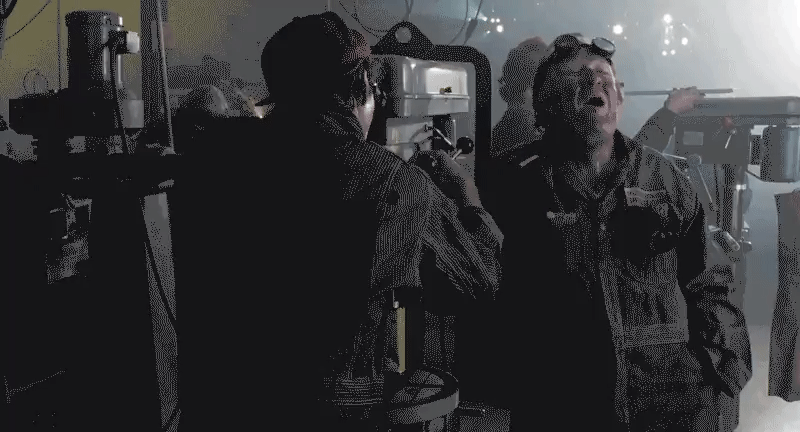
New Releases This Week:
(Review links where applicable)
Opening Buffalo-area theaters 12/09/22 -
DAMAL at Regal Transit
ELF [2003] at North Park Theatre
FATHER STU: REBORN at Regal Elmwood, Transit, Galleria & Quaker Crossing
HALLELUJAH: LEONARD COHEN, A JOURNEY, A SONG at North Park Theatre
HUNT at North Park Theatre
THE MEAN ONE at Regal Galleria & Quaker Crossing
SALAAM VENKY at Regal Elmwood
SPOILER ALERT at Regal Elmwood & Quaker Crossing
WHITE NOISE at Regal Quaker Crossing
“White Noise is funny, insightful, and downright scary at times for so much of that first two-thirds that it seems almost like the last portion was set-up to fail.” - Full review at jaredmobarak.com.
Streaming from 12/09/22 -
CHRISTMAS BLOODY CHRISTMAS - Shudder on 12/9
Thoughts are above.
DECISION TO LEAVE - MUBI on 12/9
Thoughts are above.
EMANCIPATION - AppleTV+ on 12/9
Thoughts are above.
GUILLERMO DEL TORO’S PINOCCHIO - Netflix on 12/9
Thoughts are above.
HAWA - Amazon Prime on 12/9
IT’S A WONDERFUL BINGE - Hulu on 12/9
RETROGRADE - Disney+ on 12/9 | Hulu on 12/11
Thoughts are above.
SOMETHING FROM TIFFANY’S - Amazon Prime on 12/9
ATSUKO OKATSUKA: THE INTRUDER - HBO Max on 12/10
THE KINGDOM EXODUS - “Big Brother” - MUBI on 12/11
PELOSI IN THE HOUSE - HBO Max on 12/13
TOM PAPA: WHAT A DAY! - Netflix on 12/13
I BELIEVE IN SANTA - Netflix on 12/14
KANGAROO VALLEY - Netflix on 12/14
THE BIG 4 - Netflix on 12/15
CALL ME MISS CLEO - HBO Max on 12/15
WHO KILLED SANTA? A MURDERVILLE MURDER MYSTERY - Netflix on 12/15
Now on VOD/Digital HD -
THE LEECH (12/5)
200 METERS (12/6)
CALL JANE (12/6)
“A documentary [would] probably do a better job providing details of what Jane was, but you can’t deny the power of a fictionalized narrative opening the door on an historical topic. What it lacks in historical objectivity, it makes up for with humanity.” - Full review at jaredmobarak.com.
GLORIOUS (12/6)
“There's more to Glorious than its surface-level comical surrealism, though. Beyond the out-there notion that Wes' penis might be the only thing that can save the world is the unspoken question concerning why it must be Wes in the first place.” - Full review at The Film Stage.
GUNS OF EDEN (12/6)
RAILWAY CHILDREN (12/6)
SHE SAID (12/6)
CHRISTMAS BLOODY CHRISTMAS (12/6)
DECISION TO LEAVE (12/9)
NR. 10 (12/9)
“That dry humor keeps us invested while also lulling us to sleep before genial smiles inevitably turn into cold-blooded smirks. And it culminates with a finale as satisfyingly cathartic as it is diabolically open-ended, thanks to Günther’s unyielding naivete.” - Full review at The Film Stage.


